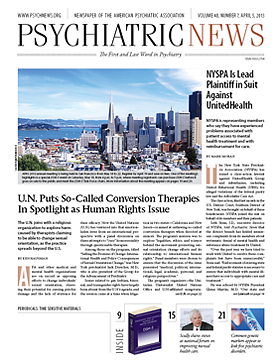Despite the attention paid to the mental health of children who survive terrorism, community violence, or natural disasters, too little is still known for certain about how to help them, according to a comparative effectiveness review.
However, some child psychiatrists who care for and study children who have experienced trauma have their reservations about the review’s conclusions.
The reviewers sifted through 6,647 abstracts but found only 21 trials and one cohort study that met their strict inclusion criteria. The review covered only “nonrelational” trauma—terrorism, community or school violence, natural disasters, or death of loved ones. A study (now in press) by the same group will address child maltreatment and domestic violence, termed “relational” trauma.
Interventions in the studies included several variants on cognitive-behavioral therapy (CBT), including trauma-focused CBT, child and family traumatic stress intervention (CFTSI), and Enhancing Resiliency Among Students Experiencing Stress (ERASE).
Those psychotherapeutic approaches do show some benefit compared with no treatment, but there was insufficient evidence for posttraumatic use of medications, concluded Valerie Forman-Hoffman, Ph.D., M.P.H., a research epidemiologist at RTI International in Research Triangle Park, N.C., and colleagues in the March Pediatrics.
Overall, the evidence base was not strong enough to recommend best treatment practices, according to Forman-Hoffman.
“The conclusions leave practitioners in a quandary about how they can be helpful,” said trauma expert Frederick Stoddard, M.D., a clinical professor of psychiatry at Harvard Medical School and a psychiatrist at Massachusetts General Hospital. “Frankly, a more positive framing of the conclusions might have been more helpful.”
But the review should not leave pediatricians with the impression that little can be done to help children who have undergone trauma, Forman-Hoffman told Psychiatric News.
“I certainly hope not,” she said. “We specifically tried to make it clear that while we cannot make a definitive conclusion, there is some evidence that points to the effectiveness of treatments that are CBT-based, including some delivered in school settings.”
“It’s a very scientific review and has strengths and limitations,” said Judith Cohen, M.D., medical director of the Center for Traumatic Stress in Children and Adolescents at Allegheny General Hospital in Pittsburgh and a professor of psychiatry at Drexel University College of Medicine in Philadelphia. “As a scientist, I respect the stringent criteria, but as a clinician I understand those limitations.”
The biggest limitation, said Cohen, is the underlying premise of the study—that children with “nonrelational” trauma are different from those with “relational” trauma and require different interventions and settings.
“But that’s a false dichotomy,” she said. “We don’t treat trauma experiences, we treat outcomes or impacts.”
There may be some overlap, said Forman-Hoffman, but she defends the researchers’ choice to separate the two types of trauma.
“Having a relationship with the perpetrator of your trauma has many different layers of complexity [compared with] having something happen by chance,” she said. “Combining them would introduce a large amount of heterogeneity, further obscuring the findings.”
“The authors acknowledged that there are effective treatments for relational trauma, but those are also effective for children who survive disasters,” said Cohen.
More and better-designed research might help, but all three experts agreed that studying traumatized children poses dilemmas.
“Disasters are difficult settings for gathering samples for research,” said Stoddard, a coauthor of Disaster Psychiatry Readiness, Evaluation, and Treatment (American Psychiatric Publishing, 2011). “That difficulty is sometimes compounded overseas by cultural attitudes about PTSD.”
Concerns about retraumatizing survivors, high treatment dropout rates, ethical and permission issues, how to blind assessors, and research funding complicate the process.
Given current funding shortages and the years needed to complete replication studies, money might be better spent disseminating existing, proven interventions, said Cohen.
“The message to pediatricians should be more positive and hopeful, that there are effective treatments, not that we don’t know enough to help these children,” she said.
The Agency for Healthcare Research and Quality funded the review.■

